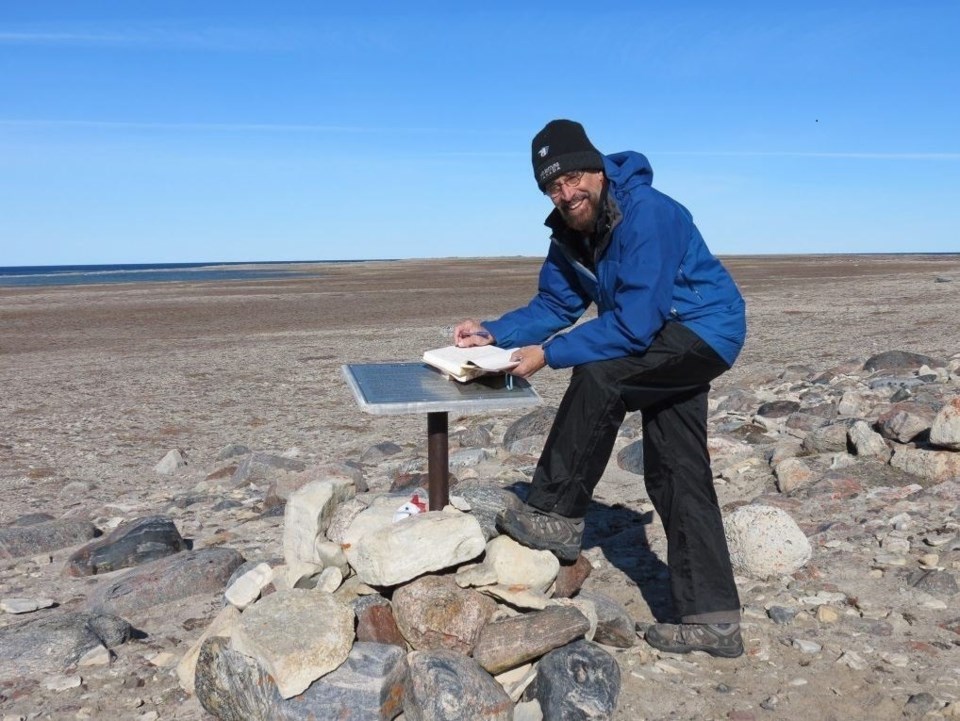This article was previously published on GuelphToday.
Arctic historian Ken McGoogan offers new answers with his latest book, Searching for Franklin, as he sets sail on a mission to discover what really happened on Sir John Franklin’s fateful 1845 expedition.
Franklin set off to discover the Northwest Passage, the sea lane that runs between the Atlantic and Pacific oceans through the Arctic Ocean, along the northern coast of North America via waterways through the Arctic Archipelago of Canada.
But Franklin’s expeditions led to catastrophe with the shipwrecks of the HMS Erebus and the HMS Terror resulting in more than a hundred deaths, including his own.
McGoogan offers a first-hand account of his travels to one of the most challenging landscapes on the planet.
But what exactly happened on that final doomed voyage?
McGoogan’s theory is ‘trichinosis’, a deadly food-borne disease caused by a microscopic parasite from eating raw or undercooked meat from infected animals.
In this case, McGoogan says it's polar bear meat, stored in barrels which was likely to have caused the deaths of the crewmen onboard the shipwrecked 1845 Franklin expedition.
“There have been many books written about this, but all of the answers put forward, have since been repudiated by the advance of science. There was no suitable answer as to the root cause of this disaster,” McGoogan said.
“I wrestled with this, and I began looking at other expeditions finding the same thing, and then, this all came together for me.”
McGoogan says the disease is not the sole cause, but the root cause.
“So, you get trichinosis, then scurvy. At that time and place, nobody knew what was going on. And down they go with a miserable death,” he said.
“I’m quite convinced. There is no physical evidence, but I make a pretty compelling circumstantial case.”
McGoogan says both ships, the Erebus and Terror, which were located in 2014 and 2016, are still currently being searched and hopefully one day, will provide more clues as to what cost the lives of expedition members.
“If underwater archaeologists bring up some barrels for example, in which polar bear meat could be found, that would provide physical evidence,” McGoogan said.
“And there’s still a possibly that bodies could be found and analyzed. And trichinosis could be determined."
McGoogan has been engaged in artic exploration history for over 25 years.
“It’s taken me that long to figure it all out. This to me is the great mystery of Arctic exploration history. It is the greatest disaster numerically with 129 men losing their lives,” McGoogan said.
As the author of 15 books, among them five bestsellers about Arctic exploration, McGoogan is also a well-known journalist and songwriter.
His awards include the Pierre Berton Award for History, the University of British Columbia Medal for Biography, and an American Christopher Award for ‘a work of artistic excellence that affirms the highest values of the human spirit.’
In 1998, McGoogan landed a fellowship that took him to the University of Cambridge for three months. There he began his biography of John Rae, Fatal Passage, which led to a number of books and prizes, as well as an award-winning, feature-length docudrama.
"Ray was the first European to discover the fate of Franklin and his men, while at the same time, discovering the only navigable Northwest Passage with which Franklin and Sir Robert McClure have been credited.”
McGoogan is a fellow of the Explorers’ Club and the Royal Canadian Geographical Society as well as a patron of the John Rae Society.
“There’s no question, this just seems to be what I do. I have been doing this since I was a teenager. It seems to be non-stop. It’s just at the centre of what I do and who I am. The research and writing, there’s never really been any thing else professionally. It’s all I’ve ever wanted to do,” he said.
This fall, McGoogan will set sail with Adventure Canada as a Royal Canadian Geographical Society ambassador.
“I will sail into the Northwest Passage, which I have done before, but I look forward to it very much,” McGoogan said.
“I’ll give a few talks on exploration history. When we land on a site, I will explain where things happened. I will also write about it too, I’m sure. I can’t help that.”
McGoogan has another book in the works coming out this fall.
As for Searching for Franklin, McGoogan says it’s a fascinating adventure story.
“Some one asked me,'what is the legacy'? Well, the legacy is the Canadian Arctic,” McGoogan said.
“Because of Franklin going sailing and getting lost, it was the great search for the Franklin expedition that opened up the map to the Canadian Arctic and gave us, basically through Britain and the British explorers, our claim to that territory.”
If this had never occurred, McGoogan says things might look a lot different today.
"You never know. Russia could have been bordering Ontario and Manitoba,” he said.
“So, it was the disappearance of Franklin and the extraordinary search that went after him, that made the Canadian Arctic, Canadian.”
Searching for Franklin can be purchased at the Bookshelf, Indigo and online.



